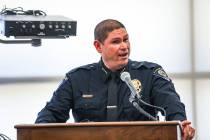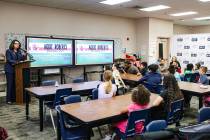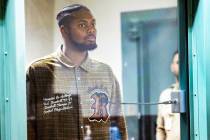What is future of education in America?
In one of his campaign speeches, President Barack Obama said, “The single most important thing we can do is make sure we’ve got a world class education system for everybody. That is a prerequisite for prosperity. It is an obligation that we have for the next generation.”
Meaningfully educated youth leave school with diplomas and are more likely to get more education, invent new ways of doing things, open businesses, benefit their fellow men and raise children who do the same. Youth who have not benefit ed from an education in this way are likely to leave school without diplomas and “will be far more likely to spend their lives periodically unemployed, on government assistance or cycling in and out of the prison system,” according to the Alliance for Education Issue Brief in October 2007 .
The brief states that if all of the dropouts from America’s class of 2007 had graduated, the nation’s economy would have benefit ed from an additional $329 billion in income over their lifetimes.
Students who learn more earn more, according to the brief, and the resulting effect of their income, taxpaying and spending benefits the economy. Dropouts drain the economy when they are unemployed or incarcerated.
Even when they are employed, dropouts earn significantly less than high school graduates, who earn less than college graduates. Lower wage earners pay lower income taxes and have less income to spend.
College graduates are likely to live longer, healthier lives, according to a paper prepared for the Symposium on the Social Costs of Inadequate Education by Peter Meunnig. This is likely attributable to a higher standard of living, which includes better health care, awareness of healthy eating habits and attention to self care.
The statistics above make it clear that educating all of our nation’s children is a matter of importance to everyone. Producing productive citizens rather than potential vagrants matters. It is the system of production, the education system, which needs rethinking.
Ask any high school student who cares about learning. They will tell you that in some of their classes, they feel engaged in learning. They can participate in hands-on lab activities and have thoughtful discussions with teachers.
In others, class seems like an exercise meant to see if they will remain submissive for 45 minutes. Not all quiet time is submissive time, of course. But perhaps the single most important question in education is, “What is the learner engaged in?”
Salman Khan has changed the way math, science, history and many other things are taught with his Khan Academy on YouTube, at www.khanacademy.org. His videos are available free to an individual or to a class.
Khan says his videos are “definitely not the current state of the art,” but he thinks some people are making a mistake when they take the current model of education and add technology to it. He prefers the idea of rethinking the model.
Sugata Mitra, born in India, is a professor of educational technology at Newcastle University in the United Kingdom. As an experiment, he embedded a computer in a wall in a slum in Hyderabad, India. Children who couldn’t speak English could walk up to the computer and try things with it. They stood together in groups around the computer, and within five or six hours they were browsing. He repeated the experiment several times, and the results were always the same.
The experiment became known in worldwide media as “The Hole in the Wall,” and can be found on YouTube at www.youtube.com/watch?v= hqsTD4CzRYM.
Mitra sees education as a liberating force and the Internet as a pedagogical tool. He believes children can teach themselves anything, given the Internet and the opportunity to interact with each other.
In the history of the world, education has been a tool for oppression, whether its logic was handed down as doctrine, as in the days of the enlightenment, or whether education was withheld, as it was from slaves in America in an attempt to keep them subservient. True education can be liberating. In fact, Mitra sees three skills as crucial to the student of the future: first, the ability to read the printed word; second, information search and retrieval skills; and last, the ability to believe.
The student of the future will learn most of what he or she knows by reading it on a screen, according to Mitra. He said information search and retrieval skills include the decision-making process involved in choosing which link to follow to find the desired information, collating the information and deciding whether it is useful or not.
The ability to believe is not armor against religion; it is armor against any doctrine that would hold the individual back. Adults, Mitra said, know how to believe in ourselves. Part of the duty of education is to imbue that into children.
Author and education expert Sir Ken Robinson gave the very first and the most widely viewed TED talk and is the author of “The Element: How Finding Your Passion Changes Everything.” (TED is a nonprofit organization devoted to Ideas Worth Spreading. It started in 1984 as a conference bringing together people from three worlds: technology, entertainment and design.) Robinson has described the education system as having been developed during the Industrial Age and according to its standards. Schools, he says, all over the world, are organized the same way.
Children are separated by age, subject matter and sometimes gender. There are lines and schedules. Subjects are treated according to similar hierarchies, no matter where you look. Math, for example, is always more important than dance.
Robinson stated that the education system was not created to help students find their best selves, but rather was created to build a large quantity of factory workers. Having a large mass of well-paid factory workers was once part of the American dream. It is not any longer. Our world has moved quickly past this point.
Educators have known for years that there is more than one kind of intelligence. More than 20 years ago, Dr. Howard Gardner of Harvard University identified eight types of intelligence. They are linguistic and verbal, logical, spatial, body and movement, musical, interpersonal (between people), intrapersonal (the inner life) and naturalist.
No one needs to be told that a person who is not good at math can be superb at music. But our education system is not set up to reward such a student.
Only a few of the kinds of intelligence are rewarded in our education system. A student must be good at math, and even if she is good at music, she must take and pass certain math classes and a mandated test in math in order to graduate.
She will be told throughout her school career that she is not smart if she cannot pass the test. Her ability in music, although recognized, will not make up for her inability to pass the math test, because this score is the one that matters in the minds of her teachers and administration.
Ntiedo Etuk, founder and CEO of DimensionU, said that although he is not a fan of immediate gratification, he is interested in relevance. He developed his learning system after watching kids play video games. He observed that kids “light up” upon encountering a game and then play for a few minutes until they fail.
Then they start over and play again, until they fail again. This safety, the feeling that it’s just fine to try and fail again and again, combined with relevance, the need to solve a problem to continue in the game, are two important aspects of learning.
America’s education system probably won’t reinvent itself, but the delivery system for teaching must change from “teacher focused” to “student focused” if we mean to engage students who don’t value education.
Mike Rugnetta of the PBS Idea Channel on YouTube said YouTube is not likely to reinvent education, but he notes that it is exciting that any student can learn calculus, physics and many other subjects from recognized experts at any time on the Internet. Because of this availability, people are becoming involved in these subjects in a new way.
Daphne Coller is co-founder and co-CEO of Coursera, which allows colleges and universities to put their best courses on the Internet, thus making a university education available to those who cannot afford it. She does not think her project and others like it will eventually bring about the demise of regular universities, because these, she said, are places where “serendipitous interactions” still take place. But she wants to make available to all that which is now available to only a few.
Coller’s passion is much like Mitra’s. An overarching theme among these education innovators is that in today’s world, students can get information themselves. Except in the most impoverished or oppressed areas in the world, knowledge is accessible.
The teacher is still needed, but not to convey information. The teacher is needed to teach and demonstrate creative thinking and problem-solving skills, to demonstrate passion for the subject matter and to push students forward.
In 2002, Ryan Mitchell, teacher of an Advanced Placement English composition class in a Clark County high school, wanted to engage his students at a higher level. His students were already committed to learning, and they had agreed to take the AP test.
But Mitchell wanted to push his students beyond where they thought they could go. They were preparing for a composition exam, and the course syllabus directed the teacher to have the students write on topics that had been previously tested once a week.
Mitchell thought his students might benefit from seeing each other’s writing so they would understand why one essay was better than another. He thought this might take their writing to the next level. He knew they would need to feel safe enough to repeatedly try and fail to do this, so he considered how to provide an environment in which trial and error would be accepted.
He invented a “Survivor” game for the students, patterned after the television show, with modifications. Each week, they would write, and he gave them a method to read each other’s essays quickly and decide which was best in their group.
With this one invention, he brought humor, competitiveness, collaboration and fun into what might otherwise have been a laborious and exhausting process. This is one example of a teacher working within an antiquated system but finding a way to reinvent the process, thus changing the very atmosphere in the room.
Robinson spoke of a test given to kindergartners on a skill called divergent thinking, which is a key aspect of creativity. If a person is good at divergent thinking, he would be able to think of many ways to use a paper clip, as opposed to thinking of only a few ways. Almost all of the kindergartners tested at genius level for this skill.
A few years later, the same children tested much lower for the same skill. A few years later, they tested even lower.
Robinson postulates that our education system teaches children that there is only one answer, and you’d better keep quiet unless you know it. Don’t ask your friend; no collaboration is allowed.
But collaboration is the way we learn. We don’t spend the rest of our lives taking multiple choice tests, we spend the rest of our lives working with people and achieving things as teams. We get ideas from others’ ideas.
Creativity is evidenced in a group of impoverished Indian children who don’t speak English and have never seen a computer, standing around one for the first time, working together.
In our economy, the institution of public education is not likely to reinvent itself. This may mean America will remain behind among educated nations whose students are willing to spend their evenings memorizing their lessons because of a societal norm that values education in itself.
Innovators in education know that their abilities and inventions do not make it down the line to the poorest children. It is the best educated, however, who must make the difference. The least educated do not know how.

















